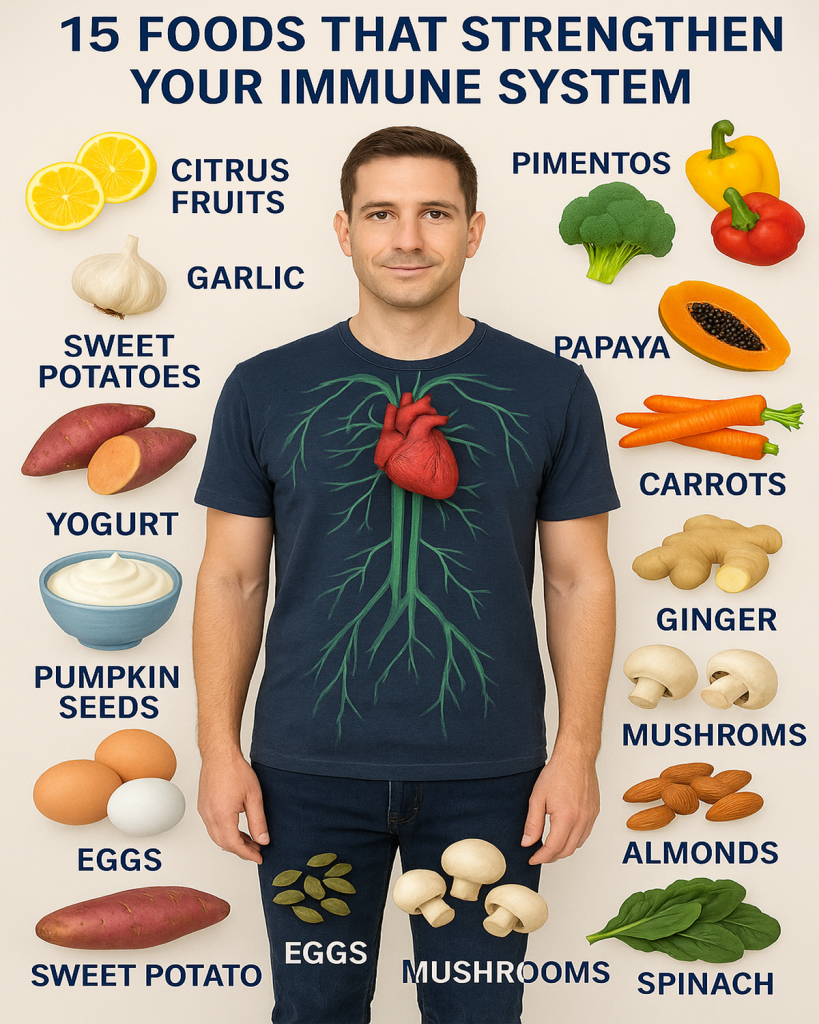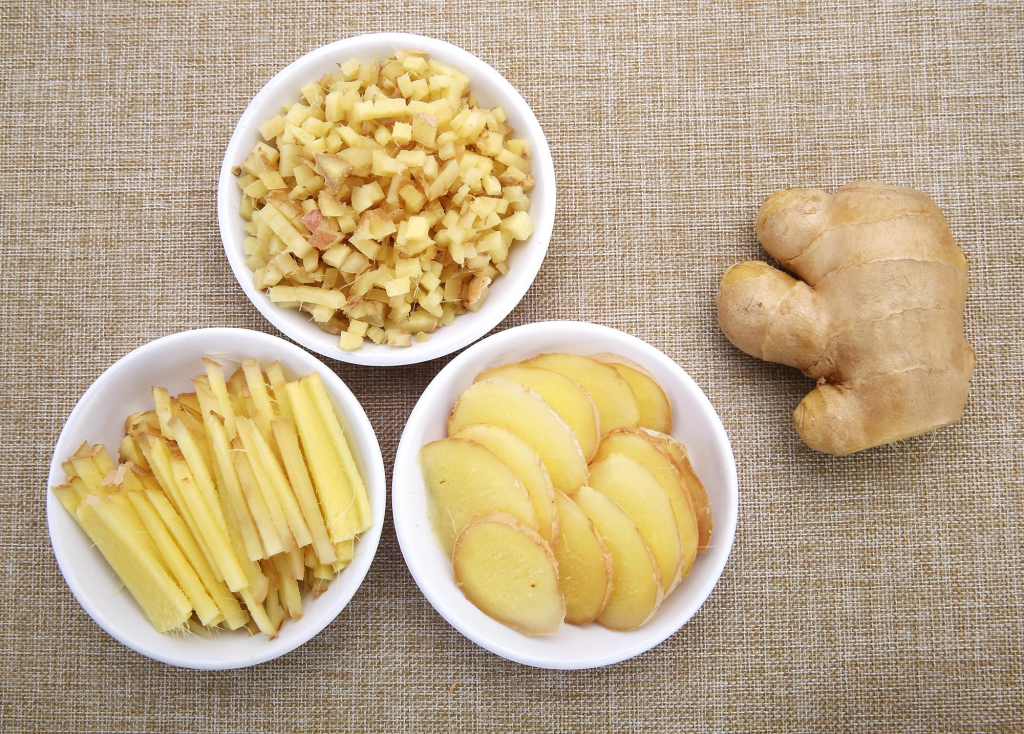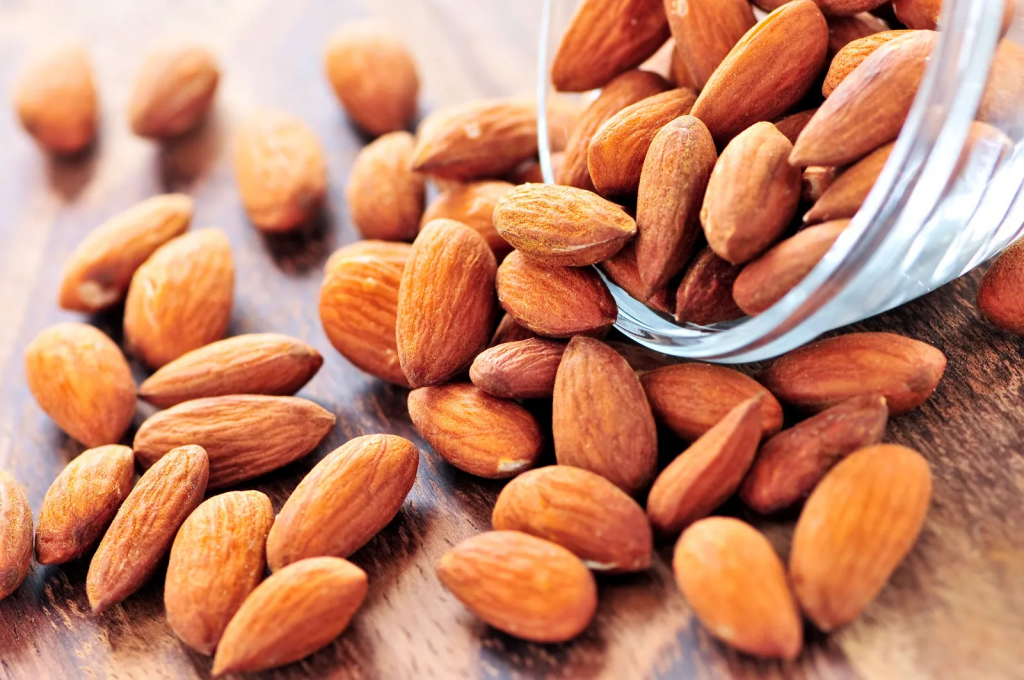Did you know that your immune system fights off millions of bacteria, viruses, and toxins every single day? Yet, modern lifestyle factors such as stress, processed foods, and lack of sleep can weaken this natural defense. According to the CDC, poor diet alone is linked to a higher risk of chronic disease and reduced immunity. The good news? The right foods can give your body the ammunition it needs to fight infections, heal faster, and keep you energized.
In this article, we’ll explore 15 foods scientifically proven to strengthen your immune system, along with practical ways to use them in daily life. You’ll learn how these foods work inside your body, real-life examples of their benefits, and simple recipes to help you incorporate them. By the end, you’ll know exactly how to build a diet that not only fuels your body but also protects it.

Why Nutrition Plays a Key Role in Immunity
Your immune system is like a personal army, and it needs the right nutrients to stay strong. Vitamins, minerals, antioxidants, and phytonutrients all work together to defend against invaders. Deficiencies in zinc, vitamin C, or vitamin D, for example, are known to lower immune function. Eating immune-boosting foods regularly doesn’t just help you recover from colds faster—it also builds long-term resilience against disease.
15 Foods That Strengthen Your Immune System
1. Citrus Fruits (Oranges, Lemons, Grapefruit)
Rich in vitamin C, these fruits help stimulate white blood cell production, which is essential in fighting infections.
How to use: Squeeze lemon into warm water every morning, or snack on fresh orange slices.
2. Ginger
Anti-inflammatory and antioxidant properties make ginger a powerful aid for sore throats and nausea.
How to use: Add fresh ginger slices to tea, smoothies, or soups.

3. Garlic
Garlic contains allicin, a compound known for its immune-boosting and antibacterial effects.
How to use: Crush raw garlic into dressings or add to roasted vegetables.
4. Spinach
Packed with vitamin C, beta-carotene, and antioxidants, spinach enhances infection-fighting ability.
How to use: Toss into salads or sauté lightly with olive oil and garlic.
5. Yogurt
Probiotics in yogurt promote healthy gut bacteria, which directly influence immunity.
How to use: Choose plain yogurt with live cultures; top with fruit and nuts for a nutrient-rich snack.
6. Almonds
A rich source of vitamin E, an antioxidant that helps maintain healthy skin barriers against infections.
How to use: Snack on a handful daily or blend into smoothies.

7. Turmeric
Curcumin, its active compound, has strong anti-inflammatory and antiviral properties.
How to use: Add turmeric to curries, golden milk, or scrambled eggs.
8. Green Tea
Contains flavonoids and epigallocatechin gallate (EGCG), powerful antioxidants that support immunity.
How to use: Replace sugary drinks with 1–2 cups of green tea daily.
9. Red Bell Peppers
They contain nearly twice the vitamin C of citrus fruits, plus beta-carotene for skin and eye health.
How to use: Slice raw into salads or roast for a sweet flavor boost.
10. Blueberries
These tiny fruits are rich in flavonoids, which reduce upper respiratory tract infections.
How to use: Blend into smoothies or sprinkle over oatmeal.

11. Mushrooms
Especially shiitake and maitake, which enhance white blood cell activity.
How to use: Sauté with garlic and olive oil or add to soups.
12. Sunflower Seeds
Provide vitamin E, magnesium, and selenium—nutrients essential for immune regulation.
How to use: Add to salads, yogurt bowls, or trail mix.
13. Salmon
A top source of vitamin D and omega-3 fatty acids, both critical for immune and anti-inflammatory functions.
How to use: Grill or bake salmon fillets twice a week.
14. Papaya
Loaded with vitamin C and digestive enzymes like papain, which reduce inflammation.
How to use: Eat fresh as a snack or blend into tropical smoothies.
15. Dates
Dates are rich in fiber, potassium, and antioxidants that help cleanse the intestines and support energy metabolism.
How to use: Eat 3–5 dates as a natural sweet snack or stuff with almonds for extra nutrition.

Simple Meal Plan to Boost Immunity
| Meal | Foods to Include | Example Dish |
|---|---|---|
| Breakfast | Yogurt, blueberries, almonds | Yogurt parfait with nuts and berries |
| Lunch | Spinach, red bell peppers, salmon | Grilled salmon with spinach salad |
| Snack | Dates, sunflower seeds | Date-almond energy bites |
| Dinner | Garlic, mushrooms, turmeric | Mushroom-turmeric soup with garlic bread |
| Evening | Green tea, citrus fruit | Cup of green tea with grapefruit slices |
Real-Life Experiences
Case Study: Emily, 32 – Struggled with frequent colds. After adding citrus fruits, spinach, and yogurt to her daily diet, she reported fewer sick days within three months.
Case Study: Daniel, 45 – Swapped processed snacks for almonds, dates, and sunflower seeds. Within weeks, he experienced higher energy and improved digestion.
Case Study: Mei, 28 – Living in a polluted city, she started drinking green tea and eating blueberries regularly. She noticed improved breathing comfort and fewer seasonal allergies.
Practical Tips for Success
- Rotate immune-boosting foods throughout the week to maximize nutrient diversity.
- Avoid overcooking vegetables like spinach and peppers to preserve vitamin C.
- Balance immunity foods with good hydration, exercise, and adequate sleep.
- Choose whole, minimally processed forms for maximum benefit.
- Consult a doctor before major dietary changes if you have chronic conditions.
Conclusion
Strengthening your immune system starts with what you eat. The 15 foods above—ranging from citrus fruits and ginger to salmon and dates—provide vitamins, minerals, antioxidants, and probiotics that help your body defend itself. Incorporating them daily doesn’t just prevent illness; it fuels your long-term vitality.
Quick Takeaways (FAQ Style):
Can these foods prevent colds completely? They reduce risk and support recovery but don’t make you immune.
How quickly will I see results? Consistency is key; benefits often show within weeks.
Do I need all 15 foods every day? No—rotate them throughout the week.
Is this safe for everyone? Yes, but individuals with allergies or medical conditions should consult their doctor.
Disclaimer: This content is for educational purposes only and does not replace professional medical advice. Always consult a healthcare provider for personalized recommendations.




